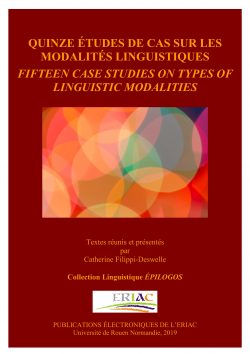Present subjunctive mood and the category of modality
Auteurs : Tatiana Schwochow PIMPÃO & Edair Maria GÖRSKI
Résumé
Dans le cadre du fonctionnalisme (Givón 1984; 1993; 1995; 2001) et de la linguistique variationniste (Labov 1972a; 1972b; 1994), nous étudions l’alternance du subjonctif et de l’indicatif présents dans les données parlées du portugais brésilien (Base de données VARSUL). L’analyse quantitative montre une préférence pour le subjonctif présent lorsque le procès verbal est orienté vers l’époque future.
Abstract
Within the framework of Linguistic Functionalism (Givón 1984; 1993; 1995; 2001) and the Theory of Language Variation and Change (Labov 1972a; 1972b; 1994), we investigate the variable use between present subjunctive and present indicative in spoken data from Brazilian Portuguese (VARSUL Database). The quantitative analysis shows the feature of future projection as a powerful conditioner for the use of present subjunctive, whereas present indicative is more likely to appear when this feature is less evident.
The authors
Tatiana Schwochow Pimpão is professor at the Instituto de Letras e Artes in the Universidade Federal Rio Grande (FURG), Brazil. She is currently completing her Doctorate at the Programa de Pós-Graduação em Linguística at the Universidade Federal de Santa Catarina (UFSC), Brazil. Her research interests include verbal mood, modality and negation. Among her publications are a book chapter: “Variação no uso do presente do modo subjuntivo” (2000); and papers such as: “Presente do subjuntivo e presente do indicativo: um encontro na história” (2009), “Interpretação qualitativa de resultados quantitativos: uma análise de aspectos metodológicos na comparação de diferentes pesquisas” (2010; with Edair Görski) and “A ‘escolaridade’ e o emprego variável do modo subjuntivo no português do Brasil” (2011).
Edair Maria Görski is professor of the Linguistics Postgraduate Program in the Federal University of Santa Catarina (UFSC), Brazil. Her areas of interest are morphosyntactic variation and change, and grammaticalization, with emphasis on semantic-pragmatic aspects. Her current research focuses on verbal moods and modal verbs, in a socio-functionalist approach. Her publications include the following papers: “Change without change” (1999; with A. J. Naro and E. Fernandes), “Motivações discursivas em competição na ordenação de orações temporais” (2000); the book chapters: “Reflexos da topicalização sobre o estatuto sintático da oração” (2008), “A questão do continuum na interface variação/gramaticaliazação” (2008); and the book: Sociolinguística (2010; with I. Coelho; G. May and C. Souza).
Première édition
Tatiana Schwochow PIMPÃO & Edair Maria GÖRSKI (2019) «Present subjunctive mood and the category of modality», dans Quinze études de cas sur les modalités linguistiques / Fifteen Case Studies on Types of Linguistic Modalities, Catherine FILIPPI-DESWELLE (éd.), Collection linguistique Épilogos, 6, Rouen, Publications Électroniques de l’ERIAC, p. 283-298.
ISBN : 978-2-919501-07-6
Article au format pdf
Pour citer l’article
Tatiana Schwochow PIMPÃO & Edair Maria GÖRSKI, «Present subjunctive mood and the category of modality»,
Epilogos, 6, 2019,
Quinze études de cas sur les modalités linguistiques / Fifteen Case Studies on Types of Linguistic Modalities
© Publications Electroniques de l’ERIAC, 2019.
URL : http://eriac.univ-rouen.fr/present-subjunctive-mood-and-the-category-of-modality/
Table des matières
- Catherine FILIPPI-DESWELLE, Avant-Propos
- Camille DENIZOT, L’adjectif verbal d’obligation en grec ancien quelques particularités modales
- Verena JÄGER, Changes in the Use of Adjectives, Quasi-Modals, and Lexical Verbs of Obligation and Necessity in Spoken American English
- Henry WYLD, Modality and Validation
- Axelle VATRICAN, La modalité ‘dynamique’ dans les constructions « saber » / « poder » + infinitif en espagnol
- Laurent GOSSELIN, Marqueurs de modalité épistémique et calcul des valeurs modales : sémantique de « savoir que »
- Marta CARRETERO & Juan Rafael ZAMORANO-MANSILLA, Disentangling epistemic modality, neighbouring categories and pragmatic uses: the case of English epistemic modal adverbs
- Rui MARQUES, On the meaning of some epistemic adverbs in Portuguese
- Gerda HAßLER, Modalité et polyphonie : marquage de la perspective du locuteur
- Tomonori OKUBO, Fonctionnements discursifs de l’euphémisme et de la litote – avec un éclairage sur une divergence franco-japonaise
- France DHORNE, Du Bien au Mal en japonais, l’adverbe « yoku »
- Pierre-Yves MODICOM, Morphosyntaxe de la prise en charge énonciative : le cas des particules modales de l’allemand
- Issa KANTÉ, Le nom recteur et l’expression de la modalité en anglais et en français
- Debra ZIEGELER, What counts as realis?
- Tatiana Schwochow PIMPÃO & Edair Maria GÖRSKI, Present subjunctive mood and the category of modality
- Catherine COLLIN, La modalité dans les recettes bilingues anglais et français. Quelques exemples de contraintes de traduction de l’injonction.






